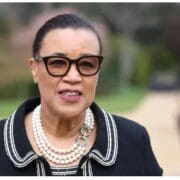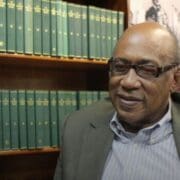Black Immigrant Daily News
A man walks past a burning barricade during a protest over the death of journalist Romelo Vilsaint, in Port-au-Prince, Haiti, Sunday, Oct. 30, 2022. Vilsaint died Sunday after being shot in the head when police opened fire on reporters demanding the release of one of their colleagues who was detained while covering a protest, witnesses told The Associated Press. (AP Photo/Odelyn Joseph)
Jimmy Cherizier zips through Haiti’s capital on the back of a motorcycle, flanked by young men wielding black and leopard print masks and automatic weapons.
As the pack of bikes flies by graffiti reading “Mafia boss” in Creole, street vendors selling vegetables, meats and old clothes on the curb cast their eyes to the ground or peer curiously.
Cherizier, best known by his childhood nickname Barbecue, has become the most recognized name in Haiti.
And here in his territory, enveloped by the tin-roofed homes and bustling streets of the informal settlement La Saline, he is the law.
Internationally, he’s known as Haiti’s most powerful and feared gang leader, sanctioned by the United Nations for “serious human rights abuses,” and the man behind a fuel blockade that brought the Caribbean nation to its knees late last year.
But if you ask the former police officer with gun tattoos running up his arm, he’s a “revolutionary,” advocating against a corrupt government that has left a nation of 12 million people in the dust.
“I’m not a thief. I’m not involved in kidnapping. I’m not a rapist. I’m just carrying out a social fight,” Cherizier, leader of “G9 Family and Allies,” told The Associated Press while sitting in a chair in the middle of an empty road in the shadow of a home with windows shattered by bullets. “I’m a threat to the system.”
At a time when democracy has withered in Haiti and gang violence has spiraled out of control, it’s armed men like Cherizier that are filling the power vacuum left by a crumbling government. In December, the U.N. estimated that gangs controlled 60% of Haiti’s capital, but nowadays most on the streets of Port-au-Prince say that number is closer to 100%.
“There is, democratically speaking, little-to-no legitimacy” for Haiti’s government, said Jeremy McDermott, a head of InSight Crime, a research center focused on organized crime. “This gives the gangs a stronger political voice and more justification to their claims to be the true representatives of the communities.”
It’s something that conflict victims, politicians, analysts, aid organizations, security forces and international observers fear will only get worse. Civilians, they worry, will face the brunt of the consequences.—–Haiti’s history has long been tragic. Home of the largest slave uprising in the Western Hemisphere, the country achieved independence from France in 1804, ahead of other countries in the region.
But it’s long been the poorest country in the hemisphere, and Haiti in the 20th century endured a bloody dictatorship that lasted until 1986 and brought about the mass execution of tens of thousands of Haitians.
The country has been plagued by political turmoil since, while suffering waves of devastating earthquakes, hurricanes and cholera outbreaks.
The latest crisis entered full throttle following the 2021 assassination of President Jovenel Moise. In his absence, current Prime Minister Ariel Henry emerged in a power struggle as the country’s leader.
Haiti’s nearly 200 gangs have taken advantage of the chaos, warring for control.
Tension hums in Port-au-Prince. Police checkpoints dot busy intersections, and graffiti tags reading “down with Henry” can be spotted in every part of the city. Haitians walk through the streets with a restlessness that comes from knowing that anything could happen at any moment.
An ambulance driver returning from carrying a patient told the AP he was kidnapped, held for days and asked to pay $1 million to be set free.
Such ransoms are now commonplace, used by gangs to fund their warfare.
An average of four people are kidnapped a day in Haiti, according to U.N. estimates.
The U.N. registered nearly 2,200 murders in 2022, double the year before. Women in the country describe brutal gang rapes in areas controlled by gangs. Patients in trauma units are caught in the crossfire, ravaged by gunshots from either gangs or police.
“No one is safe,” said Peterson Pean, a man with a bullet lodged in his face from being shot by police after failing to stop at a police checkpoint on his way home from work.
Meanwhile, a wave of grisly killings of police officers by gangs has spurred outrage and protests by Haitians.
Following the slaying of six officers, video circulating on social media — likely filmed by gangs — showed six naked bodies stretched out on the dirt with guns on their chests. Another shows two masked men using officers’ dismembered limbs to hold their cigarettes while they smoke.
“Gang-related violence has reached levels not seen in years touching near all segments of society,” said Helen La Lime, U.N. special envoy for Haiti, in a late January Security Council meeting.
Henry, the prime minister, has asked the U.N. to lead a military intervention, but many Haitians insist that’s not the solution, citing past consequences of foreign intervention in Haiti. So far, no country has been willing to put boots on the ground.
The warfare has extended past historically violence-torn areas, now consuming mansion-lined streets previously considered relatively safe.
La Lime highlighted turf wars between Cherizier’s group, G9, and another, G-Pep, as one of the key drivers.
In October, the U.N. slammed Cherizier with sanctions, including an arms embargo, an asset freeze and a travel ban.
The body accused him of carrying out a bloody massacre in La Saline, economically paralyzing the country, and using armed violence and rape to threaten “the peace, security, and stability of Haiti.”
At the same time, despite not being elected into power and his mandate timing out, Henry, whose administration declined a request for comment, has continued at the helm of a skeleton government. He has pledged for a year and a half to hold general elections, but has failed to do so.——-In early January, the country lost its final democratically elected institution when the terms of 10 senators symbolically holding office ended their term.
It has turned Haiti into a de-facto “dictatorship,” said Patrice Dumont, one of the senators.
He said even if the current government was willing to hold elections, he doesn’t know if it would be possible due to gangs’ firm grip on the city.
“Citizens are losing trust in their country. (Haiti) is facing social degradation,” Dumont said. “We were already a poor country, and we became poorer because of this political crisis.”
At the same time, gang leaders like Cherizier have increasingly invoked political language, using the end of the senators’ terms to call into question Henry’s power.
“The government of Ariel Henry is a de-facto government. It’s a government that has no legitimacy,” Cherizier said.
Cherizier, a handgun tucked into the back of his jeans, took the AP around his territory in La Saline, explaining the harsh conditions communities live in. He denies allegations against him, saying the sanctions imposed on him are based on lies.
Cherizier, who would not tell the AP where his money came from, claims he’s just trying to provide security and improve conditions in the zones he controls.
Cherizier walked through piles of trash and past malnourished children touting an iPhone with a photo of his face on the back. A drone belonging to his team monitoring his security follows him as he weaves through rows of packed homes made of metal sheets andwooden planks.
Tailed by a cluster of heavily armed men in masks, he would not allow the AP to film or take photos of his guards and their weapons.
“We’re the bad guys, but we’re not the bad-bad guys,” one of the men told an AP video journalist as he led her through a packed market.
While some have speculated that Cherizier would run for office if elections were held, Cherizier insists that he wouldn’t.
What is clear, said McDermott, of InSight Crime, is that gangs are reaping rewards from the political chaos.
InSight Crime estimates that before the killing of the president, Cherizier’s federation of gangs, G9, got half of its money from the government, 30% from kidnappings and 20% from extortions. After the killing, government funding dipped significantly, according to theorganization.
Yet his gangs have significantly grown in power after the group blocked the distribution of fuel from Port-au-Prince’s key fuel terminal for two months late last year.
The blockade paralyzed the country in the midst of a cholera outbreak and gave other gangs footholds to expand. Cherizier claimed the blockade was in protest of rising inflation, government corruption and deepening inequality in Haiti.
Today, G9 controls much of the center of Port-au-Prince and fights for power elsewhere.
“The political Frankenstein long ago lost control of the gang monster,” McDermott said. “They are now rampaging across the country with no restraint, earning money any way they can, kidnapping foremost.”——Civilians like 9-year-old Christina Julien are among those who pay the price.
The smiling girl with dreams of being a doctor wakes up curled on the floor of her aunt’s porch next to her parents and two sisters.
She’s one of at least 155,000 people in Port-Au-Prince alone that have been forced to flee their homes due to the violence. It’s been four months since she has been able to sleep in her own bed.
Their neighborhood in the northern fringes of the city once was safe. But she and her mother, 48-year-old Sandra Sainteluz, said things began to shift last year.
The once bustling streets emptied out. At night, gunfire would ring outside their window and when neighbors would set off fireworks, Christina would ask her mother if they were bullets.
“When there were shootings I couldn’t go in the yard, I couldn’t go see my friends, I had to stay in the house,” Christina said. “l had to always lay down on the floor with my mother, my father, my sister and my brother.”
Christina started having heart palpitations due to the stress and Sainteluz, a teacher, worried for her daughter’s health. At the same time, Sainteluz and her husband feared their kids could get kidnapped on the way to school.
In October, during Cherizier’s blockade, armed men belonging to the powerful 400 Mawozo gang stormed their neighborhood. That same gang was behind the kidnapping of 17 missionaries in 2021.
Christina saw a group of men with guns from a friend’s house and ran home. She told Sainteluz, “Mommy we have to leave, we have to leave. I just saw the gangsters passing by with their weapons, we need to leave!”
They packed everything they could carry, and sought refuge in the small, two-bedroom home of family members in another part of the city.
Life here is not easy, said Sainteluz, the main provider for her family.
“I felt desperate going to live in someone else’s home with so many children. I left everything, I left with just two bags,” she said.
Sainteluz scrambles to scrub clothes, cook soup for her family in the dirt-floored kitchen and help Christina sitting on an empty gasoline container meticulously doing her math homework.
Whenever a gust of wind blows through the nearby hills, the rusted metal rooftop of the house they share with 10 other people shudders.
The mother once worked as a primary school teacher, earning 6,000 Haitian gourdes ($41) a month. She had to stop teaching two years ago due to the violence. Now she sells slushies on the side of the road, earning a fraction of what she once made.
Young Christina said she misses her friends and her Barbie dolls. But, the sacrifice is worth it, Sainteluz said. Over the past few months, she’s heard horror stories of her daughter’s classmates getting kidnapped, neighbors having to pay ransoms of $40,000 and killings right outside their house.
At least here they feel safer. For now, she added.
Donate At Caribbean News Service, we do not charge for our content and we want to keep it that way. We are seeking support from individuals and organisations so we can continue our work & develop CNS further.
NewsAmericasNow.com











